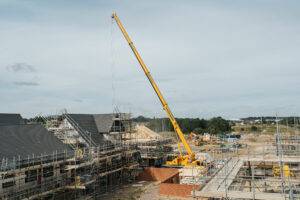Leading UK offsite frame manufacturer, Donaldson Timber Systems (DTS), has become the first timber frame manufacturer to offer a published, third party accredited environmental product declaration (EPD) for its product, proving its sustainability credentials.
As part of a process to cover the full DTS product range, the DTS Alpha system is the first off-site assembled timber frame wall panel in the UK to offer an approved EPD.
The EPD, which transparently communicates the environmental performance of a product over its lifetime, demonstrates the benefits building with timber can bring. The Global Warming Potential (GWP) of Alpha is a carbon positive, –1.53kg CO2e, meaning that 1.53kg of carbon is stored in every m2 of Alpha external wall. For a typical four bed detached home built using Alpha, 250kg of carbon is stored in the timber frame elements of the external walls alone, not including the timber floors and roof trusses.
This product life-cycle assessment supports carbon emission reduction by making it possible to compare the impacts of different materials and products accurately, allowing customers to select the most sustainable option. In comparison to the Alpha wall panel, according to the EPD produced by the Concrete Block Association (CBA), the cradle-to-grave GWP impact of 1m 2 of aggregate concrete blocks is 10.6 kg CO2e. So, for the same standard four bed detached home, 4000kg of carbon is released into the atmosphere.
Based on these figures, if the UK were to build the new Government target of 300,000 homes per year in timber frame as opposed to concrete, it would reduce annual carbon emissions by over one million metric tonnes – the equivalent of the fossil fuel generated electricity needed to run 500,000 homes for a year.
Valid for five years, the EPD is based on current available and published data for end-of-life assumptions. With advances in the industry over the next five years, along with improved building recycling processes and ongoing DTS investments – such as the recent PV panel installation in the factory at Witney – it is expected that performance will be even higher at the next review.
Alpha is the first of 16 base EPDs being worked on by DTS, covering the full product range of floor, wall and roof systems.
Open Panel timber frame is currently the most common timber frame build system in the UK, providing the structural inner leaf walls for buildings using a timber studwork factory formed into panels with structural sheathing and exterior breather membrane.
The DTS Alpha system is a cost-effective solution, offering an efficient and effective build method. Fully tested and technically supported and having been used for 50 years in the UK, this build system is often chosen by clients for their first project utilising an offsite build method.
John Smith, Technical Director at Donaldson Timber Systems, explains:
“The only way to achieve the UK target to be zero-carbon by 2050 is to firstly measure, and then reduce the whole-life carbon of buildings, from cradle to grave. The availability of EPDs is an important step in recognising this. Without measuring and reducing embodied carbon, there is a very real risk that the new buildings constructed to new standards in 2026 and beyond won’t achieve true zero carbon, as the embodied carbon in the fabric will never be offset by using even the greenest energy to run the home. This is something we feel strongly about, and one of the reasons we’re investing in this process for all DTS products.”
Alex Goodfellow, CEO of Donaldson Offsite added:
“We always champion the use of offsite timber frame construction as the best way to achieve sustainable building practices and meet net zero targets, so it’s fantastic to have a verified EPD to prove these claims. We’re seeing increasing numbers of customers asking for EPDs, as they look to meet carbon goals, and need to be able to prove that the products they specify are making a difference.
“We’re proud to be leading the industry with proof that timber frame is a carbon sink, and we’re already working on improvements to show further benefits when we review the EPD in five years’ time.”
As part of the Donaldson Group’s Offsite division, DTS prides itself on being highly sustainable, innovative and efficient. With unrivalled experience and knowledge in offsite construction, DTS has an established history of bringing new commercial and operational innovations to the market.
